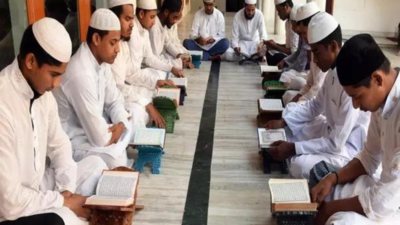Maharashtra Government Boosts Minority Education with Increased Grants and Teacher Salaries

Introduction
In a significant move ahead of the Maharashtra assembly elections, the state government has announced an increase in grants for the Maulana Azad Minorities Financial Corporation (MAMFC) by ₹300 crore. This initiative aims to enhance educational opportunities for minority communities while also doubling the salaries of madrasa teachers to improve the quality of education.
#### Increased Funding for MAMFC
The Maharashtra government has decided to elevate the capital of the MAMFC from ₹700 crore to ₹1,000 crore. This state-run corporation is dedicated to supporting economically disadvantaged minorities by providing loans for higher education and self-employment opportunities. Mushtaq Antulay, the chairman of MAMFC, expressed optimism about the funding increase, stating, "The sum will be used for uplifting the lives of minority students."
Doubling Madrasa Teachers' Salaries
In addition to boosting MAMFC grants, the state has also made substantial changes to the remuneration structure for madrasa teachers. Under the Dr. Zakir Hussain Madrasa Modernisation Scheme, the salaries for D Ed teachers have been raised from ₹6,000 to ₹16,000 per month. Similarly, the monthly honorarium for BA, B Ed, and B Sc teachers has increased from ₹8,000 to ₹18,000. This salary enhancement aims to attract qualified educators and improve the educational standards in madrasas.
#### Modernising Madrasa Education
The Dr. Zakir Hussain Madrasa Modernisation Scheme introduces a formal academic curriculum alongside traditional religious teachings, covering subjects such as mathematics, science, sociology, and languages. This initiative reflects the government's commitment to modernising the madrasa education system, making it more relevant in today’s educational landscape.
New Schemes Under MAMFC
Alongside the funding increase, the state minorities development department has unveiled several new schemes under MAMFC. One notable initiative is the 25% capital investment scheme, which offers up to 25% funding for ventures worth up to ₹5 lakh. This financial support aims to encourage entrepreneurship among minority communities, with the remaining amount to be secured through loans from nationalised or other banks at a competitive interest rate of 4% over five years.
Conclusion
The Maharashtra government's recent initiatives to increase grants for MAMFC and enhance madrasa teachers' salaries signal a strong commitment to improving educational access and quality for minority communities. As the assembly elections approach, these measures not only aim to uplift economically disadvantaged groups but also reflect the government's broader strategy to modernise education and promote self-reliance.









